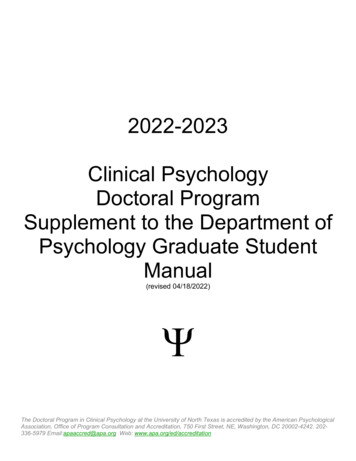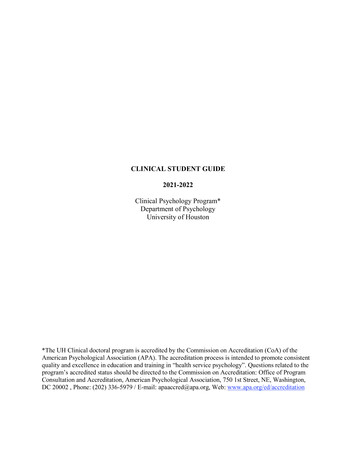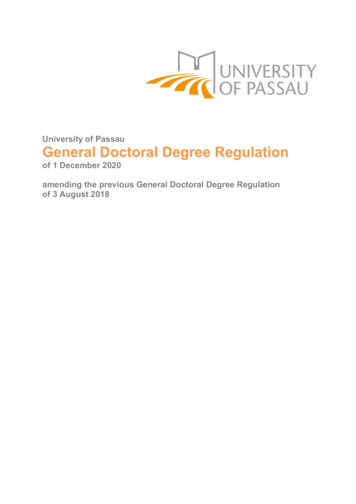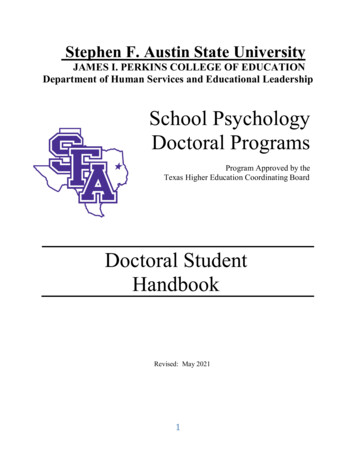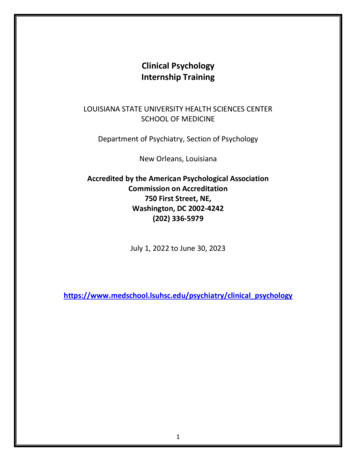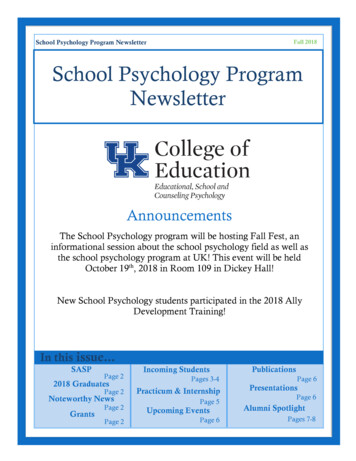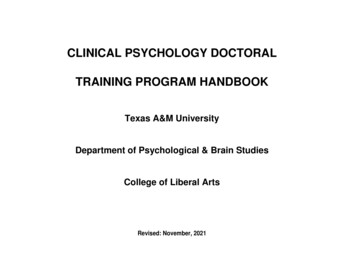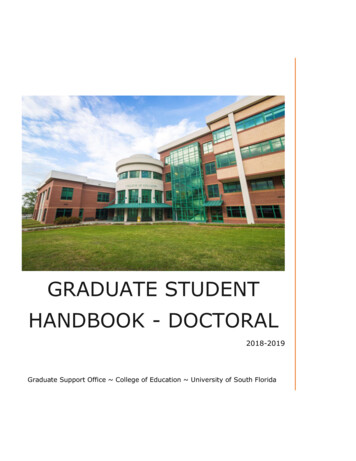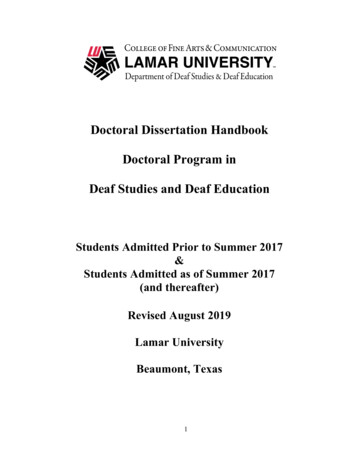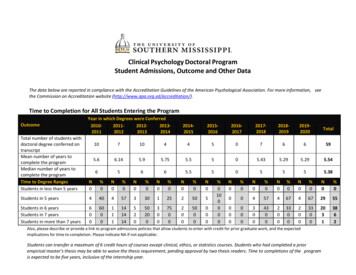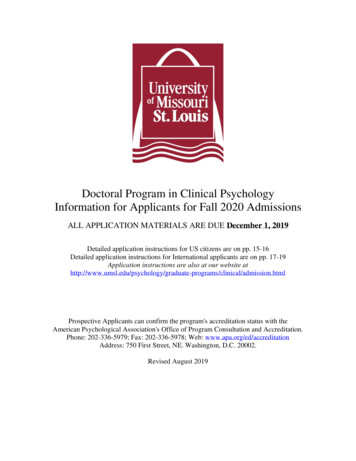
Transcription
Doctoral Program in Clinical PsychologyInformation for Applicants for Fall 2020 AdmissionsALL APPLICATION MATERIALS ARE DUE December 1, 2019Detailed application instructions for US citizens are on pp. 15-16Detailed application instructions for International applicants are on pp. 17-19Application instructions are also at our website /clinical/admission.htmlProspective Applicants can confirm the program's accreditation status with theAmerican Psychological Association's Office of Program Consultation and Accreditation.Phone: 202-336-5979; Fax: 202-336-5978; Web: www.apa.org/ed/accreditationAddress: 750 First Street, NE. Washington, D.C. 20002.Revised August 2019
2University of Missouri-St. Louis Doctoral Program in Clinical PsychologyFall 2020 AdmissionsTable of ContentsProgram Orientation . Page 3Core Clinical Program Faculty . Page 5Student Selection Processes . .Page 7Philosophy of Training . . .Page 7Our Commitment to Diversity .Page 8Admissions Criteria . .Page 8Program Curriculum . .Page 9Financial Support and Expenses . .Page 10Clinical Training Experiences . .Page 11Advisement and Evaluation . . .Page 13Applicants with Advanced Graduate Credit . Page 13Professional Conduct/Personal Integrity Issues . .Page 13Application Instructions . . .Page 15-19For More Information . .Page 20CUDCP Guidelines for Graduate School Offers and Acceptances . Page 21-23
3University of Missouri-St. Louis Doctoral Program in Clinical Psychologyfor Fall 2019 AdmissionsPROGRAM ORIENTATIONThe University of Missouri-St. Louis Doctoral Program in Clinical Psychology has been continuously approvedby the American Psychological Association since 1977. This full-time program is in accordance with thescientist-practitioner model of training. Our goal is to train clinical psychologists who are capable of generating,applying, and transmitting knowledge in order to understand, prevent, and correct psychological and socialdysfunctions. We achieve this by integrating theory, research, and clinical skills through courses, researchexperiences, and practica. We prepare clinical psychologists for careers in teaching, research, mental healthservices administration/program development, supervision, and direct clinical services.We strive to balance and integrate the academic/research and applied aspects of our program. On a 7-pointscale of research/practice orientation (1 practice emphasis; 4 equal emphasis; 7 research emphasis), ourprogram is a 6.Our program is designed with the understanding that doctoral-level psychologists in the future areunlikely to function primarily as psychotherapists and psychological assessors. Indeed, our alumni surveysindicate that most of our graduates have some combination of supervisory, training, administration, programevaluation, basic research, grant-writing, and other non-service roles in addition to, or rather than, direct serviceresponsibilities. The program curriculum provides academically rigorous preparation so that our graduates canexcel in these complex roles and responsibilities. This means that all of our students are expected to developstrong research skills, and strong clinical skills, and to form professional identities that integrate science andpractice. Because of the number of doctoral program requirements and intensity of the training experiences,part-time study is not possible.Students who complete our program thus have the option to take their careers in many different directions upongraduation. The Examination for Professional Practice in Psychology (the psychology national licensing exam)is considered one of the most objective criteria for evaluating the quality of clinical psychology trainingprograms. Graduates of the program at the University of Missouri-St. Louis have consistently scored in the top15% of 227 clinical doctoral programs on this exam over the most recent five years. This high achievement isconsistent with past program rankings.UM-St. Louis Program Goals Upon completion of the program, our students are prepared to: demonstrate a broad-based foundation of knowledge & conceptual skills necessary for research. demonstrate an ability to interpret and evaluate psychological research. conduct methodologically sound research of potential benefit to the practice of psychology. demonstrate a broad-based foundation of knowledge & conceptual skills necessary for practice. apply multiple assessment approaches that are theory-based and research-supported. apply multiple treatment approaches that are theory-based and research-supported.
4 display ethical sensitivity and ethical decision making. display sensitivity & adaptability in applying research and clinical approaches to diverse populations. follow professional standards of conduct in all areas. demonstrate a commitment to the goals of life-long learning and responsiveness to the field of clinicalpsychology as an evolving science.Qualities Linked to Success in Our Program1. Express critical thinking through written workClinical psychologists spend their careers thinking carefully about issues, and expressing these in writtenform (e.g., journal articles, grant applications/reports, and clinical documentation such as assessmentreports and progress notes). To flourish in both a doctoral program and in this field, applicants need tohave the ability to think and write effectively for multiple audiences. Because of the emphasis on writingas a psychologist, it is critical to enjoy this process.2. Commitment to lifelong learning and openness to feedbackClinical psychologists are empiricists, and revise what they think, what they do, and how they do it onan ongoing basis as new data emerge. Our science requires a focus on discovery - a commitment tolifelong learning and contributing to the profession. “State-of-the-art” clinical practice guidelines,research strategies, and statistical techniques evolve. Manuscripts and reports require multiple(seemingly countless) revisions, as do case-conceptualizations and clinical interventions. Successfultrainees are thus intrigued about the discovery process, as well as being open to feedback about areas offurther development. A certain degree of fortitude helps one thrive in this process of growth.3. Strong Interpersonal and intrapersonal skillsWhether developing new interventions as part of a research program, interacting with students andfaculty colleagues in an academic department, collaborating with a multidisciplinary team, or workingwith clients, clinical psychologists need strong interpersonal skills. Competent and effectivepsychologists listen carefully, and give thoughtful consideration of what to say (and when and how tosay it). The profession also requires strong intrapersonal qualities, including awareness and control ofone's own emotions and responses in affectively charged situations, and ethical decision making.4. Diversity of talents and interestsWhat attracts many to this field is the wide range of activities and skills required by the profession. Thedevelopment and use of research skills and statistical competencies go hand–in-hand with publicspeaking and clinical work. Strong program applicants have acquired a range of successful experiencesin academics, research, and clinical areas; this demonstrates a genuine interest and aptitude for engagingin these interrelated domains over one’s professional career.
55. Organized and effective work habitsRegardless of the setting, clinical psychologists are multi-taskers and work very hard. Most days call forthe ability to manage multiple responsibilities; many involve long work hours that do not fall within thetypical 9-5 workday. Most psychologists are also involved in administrative areas such as grant projectmanagement, budgeting, recruitment/marketing, staff hiring and evaluation. Thus, clinical psychologistsneed time management and organizational skills to help them survive this fast paced and challengingprofession. Students should be prepared for a workload during graduate school that is similar to that ofmedical school or law school.Interested in learning more about the foundational and functional competencies required within the fieldof clinical psychology? Read the following for details: Fouad, N., et al (2009). Competencybenchmarks: A model for understanding and measuring competence in professional psychology acrosstraining levels. Training and Education in Professional Psychology, 3, S5-S26.2019-20 CORE CLINICAL PSYCHOLOGY FACULTYAll core clinical faculty members teach in the doctoral program in clinical psychology; however, not all serve asboth research advisors and clinical supervisors. The faculty members available as research mentors are Drs.White, Wamser-Nanney, Taylor, Steffen, Gerstein, and Bruce. Additional information about faculty researchinterests is available on the departmental website.Kamila White, Ph.D. Dr. White has research interests in three related domains 1) prevention and treatment ofanxiety pathology, 2) the relationship between anxiety pathology and physical health (especially cardiovascularand pain conditions), and 3) investigation of new methods of assessing and treating anxiety and panic inmedical settings. Her clinical interests are in the area of anxiety, panic disorder, and behavioral medicine; she isevidence-based and primarily cognitive-behavioral in her clinical orientation. Dr. White serves both as aresearch advisor and a clinical supervisor.Rachel Wamser-Nanney, Ph.D. Dr. Wamser-Nanney's research interests include a range of topics related totraumatic stress including: 1) developing, implementing, and disseminating trauma-focused interventions,2) complex trauma, 3) gun violence, 4) co-occurring grief and trauma exposure, 5) and the cognitive andneurobiological phenotypes associated with trauma exposure. She has clinical expertise in treatments foranxiety, particularly posttraumatic stress disorder (PTSD) with infants, children, families, and adults. Dr.Wamser-Nanney is a research and clinical supervisorAnn Steffen, Ph.D. Dr. Steffen’s research and clinical interests are in the area of depression, coping withchronic illness, and behavioral medicine. Her research program focuses on interventions to enhance positivecoping and wellbeing in middle-aged and older women, especially those who are family caregiversexperiencing depression. Dr. Steffen’s clinical orientation is cognitive-behavioral, and she serves as a researchadvisor and a clinical supervisor.John Nanney, Ph.D. Dr. Nanney’s professional interests are clinical training and supervision, psychologicalassessment, and the development and provision of evidence-based behavioral health services for disadvantagedurban communities. He is particularly interested in the potential role of such services in reducing urban
6community violence, including gun violence.Emily Gerstein, Ph.D. Dr. Gerstein’s research focuses on developmental psychopathology, family processes,and risk and resilience in children with early-identified developmental risk. She is specifically interested in howdevelopmental risk affects the interactions among parental stress and wellbeing, parenting and familyinteractions, and early social emotional development. Dr. Gerstein’s clinical orientation is primarily cognitivebehavioral, although she also incorporates family systems, interpersonal, and mindfulness-based approaches,and she serves as both a research advisor and clinical supervisor.Steven Bruce, Ph.D. Dr. Bruce’s research program is located within the Center for Trauma Recovery. Dr.Bruce is interested in conducting translational research incorporating neuroimaging and psychophysiologicalassessment as both predictors and outcomes of treatment response in posttraumatic stress disorder (PTSD). Hisclinical orientation is cognitive-behavioral, and Dr. Bruce is a research advisor and a clinical supervisor.
7STUDENT SELECTION PROCESSApplications are due by December 1st of the year prior to admission. Students are admitted for full-time studyand for program entry during the Fall Semester only. Due to the structure of our program, no midyear orsummer admissions are possible. The clinical faculty considers all complete applications of students with anundergraduate GPA of 3.0; no applications are automatically rejected on the basis of GRE cut-off scores.The clinical faculty reviews all application materials and identifies approximately 30 applicants to be invited toone of our two Interview Days (Monday, 1/27/2020; Friday, 1/31/2020). Invited applicants are not required toattend; those who cannot attend will receive phone interviews and will be fully considered. Interview Days arestrictly invitation-only events.Applicants who visit the program will have the opportunity to meet program faculty and students at a receptionand are individually interviewed by program faculty and students. First offers are extended after the secondInterview Day. Alternates may receive offers as late as April 15th. Applicants who are not invited to InterviewDay receive notification by February 4th that they are no longer under consideration.PHILOSOPHY OF TRAININGWe Provide Students with a Strong Research EnvironmentOur program has a strong research emphasis and is embedded within a strong research university. TheUniversity of Missouri-St. Louis faculty continues to be among the leading researchers in their fields, accordingto the Faculty Scholarly Productivity Index from Academic Analytics. In this national index, UM-St. Louisranked in the top 10 in the country (and #1 in the Midwest) in faculty research productivity among smallresearch universities, following notable schools such as San Diego State University, Boston College andGeorgetown University.Our Philosophy of Research TrainingOur mentorship model of research training has been developed with the belief that students who work closelywith a research advisor on a focused area of inquiry are most successful in gaining the conceptual andmethodological skills needed to function as scientists. Thus, our students select research topics that fall withintheir faculty advisor's program of research, and that also allow for growing independence and personalachievements in professional research activities (conference presentations, publications, involvement inpreparation of grant applications). To help us with the process of arranging specific interviews with clinicalfaculty members during our designated Interview Days, applicants should list within their personal statementthe names of those clinical faculty members whose areas of research interest potentially overlap with their owninterests.Our Excellence in Clinical TrainingIn addition to providing high quality clinical training in assessment and intervention in our primary trainingclinic: Community Psychological Service, our program is affiliated with two specialty training clinics in ourdepartment (the Children's Advocacy Center, and the Center for Trauma Recovery). Students have opportunities
8to work with individuals across the lifespan, including children, families, adults and older adults. We aim tointegrate research and clinical experiences in the best of the Scientist-Practitioner tradition.Employment Outlook for our GraduatesGraduates of the clinical program have been highly successful in securing positions in the field of clinicalpsychology. Initial employment settings of recent graduates include post-doctoral fellowships in universityaffiliated research centers and hospitals, Veteran's Administration Medical Centers, medical schools anduniversities, liberal arts colleges, and staff psychologist positions in private and public mental health facilitiesand hospitals. Their job duties include teaching, program development and evaluation, coordination andsupervision of services (administration), and basic research, in addition to direct assessment and treatment.OUR COMMITMENT TO DIVERSITYOur program recognizes the importance of cultural and individual differences and diversity in the training ofpsychologists. These include, but are not limited to ethnicity, race, sexual orientation, culture, age, disability,gender, gender identity, language, national origin, religion and social economic status. Thus, we are committedto achieving a diverse student body and welcome inquiries about our program from potential applicants. Duringthe selection process, all students receive full consideration and are judged only by criteria required for successin the program.While in the program, all students, including ethnic and sexual minority students, are given ample facultyattention and support to allow them to proceed through the program successfully. In regard to the programcurriculum, a diversity course is offered, and components of all core courses are designed to prepare studentsfor work with diverse populations. Students gain extensive clinical experience working with diverse populationsour training clinic, program-based practica, and clerkships. A Monday Forum, held each Monday afternoon, isdedicated to addressing diversity issues. Students do not need to give up their personal and/or religious valuesbut trainees are expected to attain both demographic competency and demonstrate the competency of dynamicworldview inclusivity. Clinical faculty members and a most of our students are members of the UM-St. LouisSafe Zone community.ADMISSION CRITERIAAdmission to the clinical psychology doctoral program requires a minimum undergraduate G.P.A. andpsychology G.P.A. of 3.0 or above, but due to strong competition, students admitted to our program typicallyhave outstanding undergraduate academic records with G.P.A.s that average 3.6 to 3.9 across entering years.Applicants usually have an undergraduate degree in psychology, but may apply with a minimum of 21 units ofundergraduate psychology coursework (typically 7 semester-long courses). These units must includecoursework in introductory psychology, statistics for the social sciences, and research design inpsychology. It is recommended that the undergraduate preparation include coursework in history and systems,physiological psychology, social psychology, cognitive psychology, developmental psychology, in addition toexperience with psychological research. Thus, for individuals without a BA or BS in psychology, Masters’ levelcoursework in a counseling-related area does not meet these requirements, and post-BA undergraduatecoursework in a department of psychology is still needed.
9The GRE scores and grades of our incoming students, statistics on program and internship applications andadmissions, and program completion rates for the past seven years are provided at the end of this applicantbrochure.The University of Missouri-St. Louis follows affirmative action guidelines in all selection procedures anddecisions. Moreover, the clinical faculty is committed to increasing the diversity of the students in our programand welcomes applications from all qualified students. The program conforms to the Guidelines for GraduateSchool Offers and Acceptances adopted by the Counsel of the University Directors of Clinical Psychology.These guidelines are provided at the end of this brochure.PROGRAM CURRICULUMThe graduate curriculum is rooted in a core of required courses in research methods and content areas ofpsychology. All students are required to take a two-semester sequence in quantitative methods in their first year.During the first three years of the program, students take courses in applied research methods, socialpsychology, history and systems of psychology, cognitive psychology, biological bases of behavior,psychopathology, as well as elective coursework. In the first two years of the program, students complete aresearch project under the supervision of the research advisor. Students receive the Master of Arts Degree inPsychology for completion of the first two years of academic study.Regularly offered electives include: Gender, Sexuality & Health, Behavioral Medicine, Trauma and Recovery,Neuropsychological Assessment, Psychopharmacology, Psychopathology & Aging, Psychometric Theory,Advanced Multivariate Statistics, among others.Within the context of this base of scientific knowledge and competence, students pursue the professionalaspects of clinical psychology through skill courses in cognitive and personality assessment, clinicalinterventions, multicultural issues, ethical and professional issues, and through supervised clinical practice.Program case conferences provide an opportunity for all students and faculty to discuss clinical issues as agroup. Intervention courses include Introduction to Clinical Interventions and Behavioral and CognitiveTherapies, in addition to the directed readings that are part of practicum experiences.Students participate in practica in our Community Psychological Service and a clinical clerkship, which may bein a community or university-based setting. Students participate in at least one year of clerkship and three yearsof training in the Community Psychological Service. By the time of the internship, students have received aminimum of 1500 hours of supervised clinical experience and are highly competitive for positions in internshipprograms.The program is committed to providing diversity training for all students. This training includes specializedMulticultural coursework; the integration of diversity-relevant material across the curriculum; and clinicaltraining with diverse populations in campus-based and community placements. A number of our facultymembers and students have received training in issues specific to sexual orientation, and are members of thecampus Safe Zone community.Students are engaged in coursework, research, and practica during their first four years in the program and arenormally prepared for the internship by the fifth or sixth year. The internship is a paid, full-time clinicaltraineeship, and students from our program have been highly successful in obtaining the internship positions.
10Students select the potential sites for their internship under the guidance of their advisor and the ClinicalDirector. There are two APA-approved internships in St. Louis with a limited number of spaces for interns;some students obtain positions in these programs, but most students take internships outside the St. Louis area.All students should be prepared to complete this 12-month internship away from the St. Louis area, if necessary,due to the high degree of competition for internships.The program does not require language proficiency. However, students are required to complete their SpecialtyExamination prior to their dissertation proposal. To complete this requirement, students must demonstrate athorough knowledge of a topic area chosen in consultation with their research advisor. Successful completion ofthe written paper and oral examination of the Specialty functions as the Comprehensive Examination for theGraduate School, and is required for advancement to doctoral candidacy.The program is designed to be completed in five years of full-time study; however, it should be noted thataverage time to completion is six years. The primary cause of graduation in the sixth or seventh year of theprogram is that students elect to take advantage of optional research, teaching, and clinical opportunities prior tothe internship. Students have a maximum of seven years to complete all requirements, including internship.Areas of ExperienceStudents have a number of opportunities to gain specialized training during their time in the program. Animportant campus resource is the Certificate in University Teaching offered by the UM-St. Louis Center forTeaching and Learning. Students who wish to do so are given the opportunity in their advanced years to becomeformal instructors for an undergraduate course, under the supervision of a faculty teaching mentor.Within the program, clinical training opportunities in the area of Child & Family are available to all of ourstudents. Behavioral Medicine and Trauma Studies. These areas provide specialized research and clinicaltraining in preparation for professional roles in contemporary psychology. Students have the option of selectingone area of experience, but are not required to do so (i.e., approximately 50% of our students select a focusarea). Please Note: Due to the international reputation of our Center for Trauma Recovery, applicants with aninterest in trauma-related research should have prior research experience in a related area and strong letters ofrecommendation from research supervisors. Your decision to identify yourself in your application and personalstatement as solely interested in trauma-focused research places you in keen competition with a large number ofapplicants to our program.Students may select their area of experience at any time in the program. However, selection early in theprogram is advisable to allow time to plan coursework, research, and clinical training in the areas ofspecialization. Students who select an area choose an advisor who specializes in that area. Students may changeadvisors at any time to accommodate their changing interests across the areas of specialization.FINANCIAL SUPPORT AND EXPENSESOver 95% of the students in our program receive funding for their entire time in the program. A small numberof our students choose to not work in assistantships due to ongoing family or other responsibilities. The sourceof funding varies as students’ progress through the program. Students who are admitted to the program areusually assigned a graduate assistantship for their first two years in the program. The graduate assistantshipincludes teaching, advising, administrative and/or research responsibilities. Duties are assigned in accordance
11with students' interests, training, and experience. The amount of the graduate stipend for 2019-2020 will be aminimum of 16,000 for first year students. In addition to this support, students with graduate assistantshipsreceive tuition scholarships. Students from underrepresented groups may receive special assistantship funds.Advanced students (third year and beyond) will usually have part-time clerkship or other professional positionseither on or off campus providing support in the range of 15,000 to 20,000. Additional financial assistance isoffered in the form of loans through the University Financial Aids Office.Living expenses in St. Louis tend to be low relative to larger cities and the coasts. Rents for one bedroomapartments start at about 450 to 550 a month and some apartment complexes are close to the campus.Graduate student housing is available on campus. For students with assistantships and clerkships, total fees (i.e.,parking, books, health insurance) per year are approximately 2500 in each of the first three years and may bebetween 1000 and 2000 in later years, depending upon course schedule and health insurance coverage.To see the cost of living in St. Louis compared to that of another city, go to http://www.homefair.com and selectthe Salary Calculator in the top left column. St. Louis offers more free, major visitor attractions than any otherplace outside of the nation’s capital, including the Saint Louis Art Museum, Saint Louis Zoo, Cahokia Mounds,Museum of Westward Expansion, St. Louis Science Center, Missouri History Museum, Anheuser-BuschBrewery, and Grant’s Farm. For information about living in St. Louis, go to www.explorestlouis.com.CLINICAL TRAINING EXPERIENCESCommunity Psychological ServiceThe Community Psychological Service (CPS) was established in 1977 to provide clinical and research trainingfor psychology doctoral students. CPS is directed by a member of the clinical program faculty. CPS is acommunity-oriented facility that offers a wide range of clinical services to the public and consultation to outsideagencies. CPS provides students an opportunity to work with clients of varying ages, social classes, ethnicgroups, diagnoses, and levels of severity of illness.Students receive training within the structure of the clinical team, which includes a member of the clinicalfaculty and a cross section of students from beginning and advanced levels of training. Teams meet regularly fordiscussion of ongoing cases. Individual supervision is also provided on some teams. In the context of providingprofessional service to clients and agencies, the team discusses theoretical and research issues related to clientsand their social functioning in addition to specific treatment planning. The ethos of the clinical supervision teamencourages collaborative learning among students.Each student in CPS is assigned responsibilities commensurate with their experience and training. Beginningstudents may be engaged in co-therapy with a more advanced student; advanced students have fullresponsibility for individuals, groups, couples, and/or families. Advanced students on the team gain experiencein the supervision of beginning students.Each year, one or more advanced clinical students obtain their paid clerkship experience at CPS. Clerkshipstudents receive advanced training in psychodiagnostic assessment in fulfillment of contracts with local mentalhealth centers, school systems, and state agencies. In addition, clerkship students participate in and learnvaluable skills in clinic administration.
12Center for Trauma RecoveryThe Center for Trauma Recovery is a part of the psychology department and provides research and clinicaltraining opportunities for the treatment of trauma survivors. The clinic at the Center for Trau
University of Missouri-St. Louis Doctoral Program in Clinical Psychology for Fall 2019 Admissions PROGRAM ORIENTATION The University of Missouri-St. Louis Doctoral Program in Clinical Psychology has been continuously approved by the American Psychological Association since 1977. This full-time program is in accordance with the

